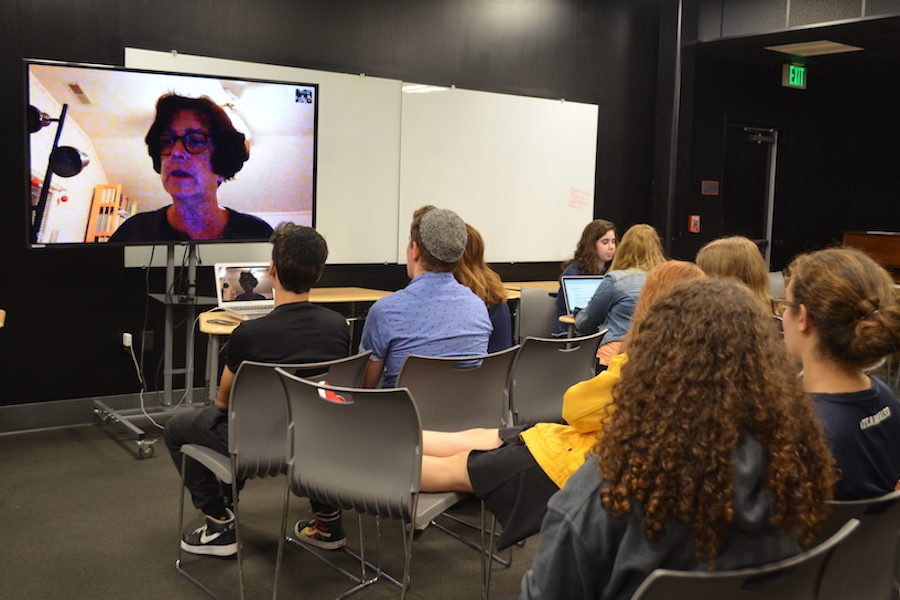‘Radium Girls’ playwright meets Shalhevet actors via Skype
Students and author discuss use new technology to discuss perils of old technology
CHAT: D.W. Gregory answered questions during a 45-minute long-distance visit with members of Shalhevet’s Drama Ensemble.
November 12, 2018
“Plays aren’t written,” said the woman on the TV screen in the Wildfire Theater Oct. 18.
“They are crafted.”
The author and playwright Ms. D.W. Gregory, who was addressing Shalhevet’s Drama ensemble via a Skype call about her play Radium Girls, as they worked together to craft the performances school will see next month.
Ms. Gregory was invited by Drama director Ms. Emily Chase to speak to the actors — from afar, since she lives in Maryland — so they could get a better understanding of the play, which will be presented at school Dec. 10 – 16.
The after-school call lasted about 45 minutes, during which time Ms. Gregory answered questions about the play’s characters, its tone, its shortened version, and what she has learned by watching people perform it.
One thing clarified was that Ms. Gregory intended for the play to be at least partly humorous, though it explores a serious topic.
“Right before I got published I attended several productions because I was still working on the script.” Ms. Gregory replied. “A lot of discoveries that came out of the first production for me were seeing how sections of the play that were not intended to be funny were made into that.”
Freshman Noah Masliah asked Ms. Gregory whether she was going for a darker or happier tone. Both, she replied.
“There is a lot of humor in the play,” Ms. Gregory said, referring to several particular scenes. “Don’t be afraid of that. The humor is important.”
Set in New Jersey during the 1920’s, Radium Girls is based on a true story of young factory women who were given no protective clothing while using toxic radium-laced paint to paint the dials on watches. They were told the radium they were working with was harmless, but eventually the women become ill, and began to campaign against the company.
Get the latest from The Boiling Point. Sign up for our news feed.
It portrays the disastrous effects of the situation, including the point of view of the men in charge of the company and their careless attitude toward the situation; other issues tackled along the way include greed and wealth. Among the maladies the women experienced were anemia, bone fractures, and necrosis of the jaw — a condition known as radium jaw.
Ms. Gregory shared that her script was based on a book called Radium Girls: Women and Industrial Health Reform, by Claudia Clark, which was first published in 1997. Ms. Gregory said she did additional research of her own.
She wrote the version Shalhevet is working on after several high school teachers asked her to shorten her original play so they could use it with their students. Those teachers wrote versions of their own, but they weren’t writing it the way she had envisioned. The shorter version came out a few years ago.
“I got tired of having to sift through people’s cuttings, so I decided that I would just write my own boiled-down version.” Ms. Gregory said.
The leads in Shalhevet’s production are being played by seniors Daniel Medevoy, as Mr. Roeder, the chief advisor and employer of the radium girls; and Hannah Merritt as Grace Fryer, a dial painter who fights for her day in court after becoming ill from radium poisoning. Students have been rehearsing since September.
After answering the actors’ questions, Ms. Gregory shared some tips about how to write a play.
“When I write a script, I envision certain things happening in the scene, but don’t exactly know how it is going to play out until you do it and see it happening,” said Ms. Gregory.
She said going to rehearsals teaches you a lot about the script you have written. During rehearsal, if a character said a line differently than she imagined it to be said, but it sounded more natural, she would change the script itself.
Skype presented some problems that an in-person visit with the playwright would have avoided. Ms. Gregory’s microphone would periodically stop working for a few seconds, and at one point Ms. Gregory’s voice and face faded in and out, making it very difficult to hear anything being said.
But the actors considered the interruptions minor.
“Getting to meet the playwright helped the cast better understand what she had envisioned when creating the script,” said senior Donna Grunfeld “In knowing this, we were also able to get a better idea of how our respective characters would act.”
Daniel Medovoy, the lead in the play said that “The interview with the playwright was very helpful for me to understand the dynamics of the characters.”
Ms. Gregory wished all of the drama students luck in their upcoming performance, and told Ms. Chase that they could be in touch through email if need be.
The play will be performed free for students during the school day, and in additional paid performances at night for parents.















